|
|
|
Sort Order |
|
|
|
Items / Page
|
|
|
|
|
|
|
| Srl | Item |
| 1 |
ID:
134641


|
|
|
|
|
| Summary/Abstract |
Despite sustained critique of a neo-Malthusian focus on ‘overpopulation’, the issue continues to resurface regularly within international development discourse, particularly with respect to ‘sustainable’ development in relation to growing environmental security concerns. This suggests that the issue defies purely rational evaluation, operating on a deeper psychodynamic register. In this paper we therefore analyse the population question as a ‘scapegoat’, in the psychoanalytic sense of a fantasmatic construction concealing the gap between the symbolic order of international development and its persistent failure in practice. By conjuring the age-old image of animalistic barbarian hordes breeding inexorably and therefore overflowing their Third World confines to threaten the security – and enjoyment – of wealthier nations, the overpopulation bogeyman helps to displace attention from systemic issues within the political economy of development, namely, the futility of pursuing sustainable development within the context of a neoliberal capitalism that characteristically exacerbates both economic inequality and environmental degradation.
|
|
|
|
|
|
|
|
|
|
|
|
|
|
|
|
| 2 |
ID:
134647


|
|
|
|
|
| Summary/Abstract |
This paper starts from the assumption that geostrategic and security interests alone are not sufficient to explain China’s foreign policy choices. It argues that ideas about what China’s role as an actor in the increasingly globalised international system should be, and about world order in general, have a deep influence on China’s foreign policy decision-making process. Taking the North Korean issue as a case study, the paper postulates that China is currently engaged in a search for a ‘new’ identity as a global player. China’s actor identity is composed of various partly contradictory role conceptions. National roles derived from China’s internal system structures and its historical past lead to continuity in foreign policy, while the ‘new’ roles resultant from China’s rise to global power require an adaptation of its foreign policy principles. In the case of its relationship with North Korea, China’s foreign policy is oscillating between the two roles of ‘socialist power’ – as thus comrade-in-arms with its socialist neighbour – and ‘responsible great power’, which leads to it being expected to comply with international norms, and thus to condemn North Korea’s nuclear provocations and related actions.
|
|
|
|
|
|
|
|
|
|
|
|
|
|
|
|
| 3 |
ID:
134640


|
|
|
|
|
| Summary/Abstract |
Fair trade coffee sales have boomed since the late 1980s, making it one of the most recognised forms of ‘ethical consumerism’ in the world. Around the same time exports of lower quality coffee beans from Vietnam also boomed, launching Vietnam from an insignificant coffee exporter to the world’s second largest with historically unprecedented speed. These disparate projects have had significant impacts on thousands of farmers – with Vietnam’s new class of coffee producers representing three and a half times the number of coffee families certified by fair trade. Northern actors, however, have given far more public and positive attention to fair trade. This article will argue that this difference does not stem from a strictly objective appraisal of the relative merits and shortcomings of each project, but from the compatibility of fair trade with ‘free trade’ and its emotionally charged ideological fantasies. This includes unconscious beliefs and desires around individualism, voluntarism, democracy and the affirmation of the exaggerated power of Northern consumers – as opposed to the Southern agency and complicated collective action implied by Vietnamese coffee statecraft.
|
|
|
|
|
|
|
|
|
|
|
|
|
|
|
|
| 4 |
ID:
134638


|
|
|
|
|
| Summary/Abstract |
Philanthrocapitalism is promoted as a form of development funding that infuses philanthropy with the dynamism and innovation of capitalist enterprise. Millennium Promise is a philanthrocapitalist organisation based in New York, which finances the Millennium Villages Project (mvp) across 10 countries in sub-Saharan Africa. At the level of its discursive articulation Millennium Promise appears as a Foucauldian ‘anti-politics machine’: a mechanism of transnational governmentality devoted to the biopolitical production of entrepreneurial subjects organised in self-disciplining communities. Drawing on psychoanalytic theory and field research conducted in Uganda, I argue that philanthrocapitalism is better understood as an ideological formation, which mobilises a disavowed enjoyment of global inequality. In the case of Millennium Promise this enjoyment is structured by specific social fantasies: cause-related marketing campaigns invite Western consumers to enjoy their imagined distance from ‘African’ suffering; the mvp functions as a narcissistic mirror, which offers a reflection of capitalist society cleansed of its class antagonism; and, through the staging of messianic rituals, the mvp mobilises a shared enjoyment of pseudo-colonial relations of domination. I conclude that philanthrocapitalism is not an anti-politics machine but a fantasy machine, which demonstrates the limitations of Foucauldian critique, and forces us to confront our own relations to enjoyment.
|
|
|
|
|
|
|
|
|
|
|
|
|
|
|
|
| 5 |
ID:
134648


|
|
|
|
|
| Summary/Abstract |
Sustainable development’ – as currently and politically correctly formulated – provides an inappropriate basis on which to frame a future-oriented UN agenda, and risks perpetuating patterns of assistance in which most UN organisations perform poorly and in the shadow of alternative and more able multilateral and bilateral sources. UN operations should take as their point of departure the comprehensive agenda outlined by the two world summits of 2000 and 2005. This agenda recognises the value-based UN as the only universal-membership organisation, which combines the concerns of satisfying human needs while ensuring security, human rights, justice and sound governance. The post-2015 agenda should not look only at development and environment but aspire to what a million global voices canvassed by the UN in ‘the world we want’ campaign are clamouring for.
|
|
|
|
|
|
|
|
|
|
|
|
|
|
|
|
| 6 |
ID:
134645


|
|
|
|
|
| Summary/Abstract |
This article examines the adoption of the rights-based approach (rba) to development at ActionAid International, focusing in particular on its Education Theme. Although there has been a considerable volume of work that examines the rise of rba, including in the pages of Third World Quarterly, the power dynamics and conflict involved in shifting to rba have largely gone unnoticed and explored. Using the methodological tools of discourse analysis and social movement theory on strategic issue framing, I examine how ActionAid leadership worked to ‘sell’ rba to somewhat resistant staff and partners. I argue that ActionAid struggled to reconcile its commitment to global rights norms with the ongoing needs-based programming at country level. This raises important questions about the power dynamics involved when an ngo undergoes a process of organisational change, even when, as is the case with rba, this is widely seen as a progressive and desirable transition.
|
|
|
|
|
|
|
|
|
|
|
|
|
|
|
|
| 7 |
ID:
134646
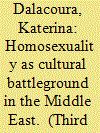

|
|
|
|
|
| Summary/Abstract |
The culture wars over homosexuality in the Middle East are studied here in the context of the theoretical debate on culture in International Relations and, more specifically, through a critical examination of postcolonial international theory. The paper argues that, although postcolonialism can offer a useful framework, it also has, in its poststructuralist variants, significant limitations in addressing the controversial issues surrounding homosexuality as cultural battleground in the Middle East. These limitations derive from an unconvincing interpretation of the relationship between the Middle East and modernity; and a problematic approach towards moral agency. The paper serves a dual purpose. Through the use of the empirical material, it furthers the debate within postcolonial international theory by bringing evidence to bear in support of its humanist or materialist strands. The theoretical discussion, in turn, by highlighting the intertwining of culture and power in the debates on homosexuality, strengthens the case for respecting homosexual rights in the Middle East region.
|
|
|
|
|
|
|
|
|
|
|
|
|
|
|
|
| 8 |
ID:
134644


|
|
|
|
|
| Summary/Abstract |
A common consequence of the fragmented supply practices of multinational corporations are unfair and exploitative working conditions in the global South. Many corporations face this, and the resulting reputational damage, by installing voluntary codes of conduct in their supplier factories, leading to a vast range of implementation practices by the factory managers. Despite this effort, the literature shows that the positive impact of these codes on labour conditions in such factories remains insufficient. This article argues that this insufficiency is rooted in the exclusiveness and eurocentrism of codes of conduct and elaborates on why corporations tend to prefer influencing certain labour conditions over others. It concludes by briefly discussing multi-stakeholder organisations as a possible solution to these predicaments, and points the way to further research on the topic.
|
|
|
|
|
|
|
|
|
|
|
|
|
|
|
|
| 9 |
ID:
134642
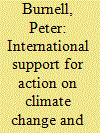

|
|
|
|
|
| Summary/Abstract |
International support for democracy and climate action (mitigation; adaptation; addressing climate loss and restoring damage) are two distinct spheres: motivations, purposes, activities and the relevant literatures exist independently of one another. This article challenges this separation by investigating the scope for policy complementarities that potentially could further both democracy support’s objectives and climate action. Findings that address possible future scenarios where global warming exceeds safe limits or where democracy and democratisation are threatened by climate change impacts are worth exploring. The article’s provisional findings are mixed but provide grounds for believing that democracy support and democratisation potentially could gain from taking support for climate action into consideration and that climate action might benefit too.
|
|
|
|
|
|
|
|
|
|
|
|
|
|
|
|
| 10 |
ID:
134639


|
|
|
|
|
| Summary/Abstract |
This paper explores the motivations behind the outward foreign direct investment (ofdi) decisions in the past decade of an East Asian government-linked corporation (glc), the largest company of its kind in the world in terms of sectoral specialisation. This glc has travelled far from its origins as an agent of European imperialism to its current controversial role spearheading postcolonial extra-territorialisation strategies. I argue that financial predation is the synechdoche for territorialisation in the new imperialism. Consequently emerging economies pre-empt the financial siege by embarking on ofdi strategies themselves to create economic buffer territory. I construct a psychoanalytical framework for examining how anxiety is acted out in the global economy. I apply concepts of the traumatic moment, anxiety and the defence mechanisms of disavowal, splitting, introjection and projection to analyse the glc’s investments as territorial displacements of the libidinal economy.
|
|
|
|
|
|
|
|
|
|
|
|
|
|
|
|
| 11 |
ID:
134636
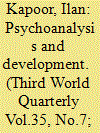

|
|
|
|
|
| Summary/Abstract |
International development has tended to ignore – or, tellingly, repress – human/social passions. Yet the theory and practice of development is replete with disavowed memories (racism, (neo)colonialism, gender discrimination) and traumatic prohibitions (economic recession, poverty), which show up in dreams and fantasies (the exoticised Third World, structural adjustment as universal panacea), obsessions (economic growth, ‘wars’ against poverty or terror), or stereotypes (denigration, infantilisation, sexualisation or feminisation of the Third World Other). Psychoanalysis aims precisely at helping tease out these passions, that is, the unconscious fantasies and desires embedded in development. It helps explain the gap between development’s scientific commitments (eg belief in progress, neutrality, objectivity, rationality) and its irrational practices (eg the seductive draw of narrow capitalistic growth, the fatal pull to aggressive racism, or the blind conformity to bureaucratic procedures or ethnic/religious identities). It helps us understand that development is not only a socioeconomic construction, but also an ideological construction intent on effacing its various internal traumas and contradictions – for example, the way in which development is “naturally” equated with neoliberal growth and liberal democracy, concealing the reality of rapacious capitalism, growing global inequalities and unevenness, and diminishing avenues for political contestation. The five articles in this sub-theme for Third World Quarterly aim to examine the intersection of psychoanalysis and development, applying in particular (although not exclusively), a Lacanian/Žižekian lens to a range of development issues.
|
|
|
|
|
|
|
|
|
|
|
|
|
|
|
|
| 12 |
ID:
134637
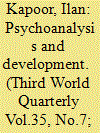

|
|
|
|
|
| Summary/Abstract |
This article examines the contributions of psychoanalysis to international development, illustrating ways in which thinking and practice in this field are psychoanalytically structured. Drawing on the work of Lacan and Žižek, the article will emphasise three key points: (1) psychoanalysis can help uncover the unconscious of development – its gaps, dislocations, blind spots – thereby elucidating the latter’s contradictory and seemingly ‘irrational’ practices; (2) the important psychoanalytic notion of jouissance (enjoyment) can help explain why development discourse endures, that is, why it has such sustained appeal, and why we continue to invest in it despite its many problems; and (3) psychoanalysis can serve as an important tool for ideology critique, helping to expose the socioeconomic contradictions and antagonisms that development persistently disavows (eg inequality, domination, sweatshop labour). But while partial to Lacan and Žižek, the article will also reflect on the limits of psychoanalysis – the extent to which it is gendered and, given its Western origins, universalisable.
|
|
|
|
|
|
|
|
|
|
|
|
|
|
|
|
| 13 |
ID:
134643
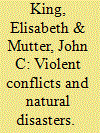

|
|
|
|
|
| Summary/Abstract |
Comparisons between disasters and violent conflicts are often noted by political figures and in the news media, and those responding to conflicts and disasters witness similarities on the ground. In contrast, the academic fields studying violent conflicts and so-called natural disasters have developed separately and practitioners usually separate the two phenomena as soon as the emergency response is over. This paper, based on interviews with practitioners and a review of scholarly literature, makes a case for increased cross-disciplinary dialogue. We identify common consequences, responses and even causes of conflicts and disasters. We argue that more and better partnerships between those who work on conflicts and those who work on disasters can lead to advances in understanding and responding to conflicts and disasters.
|
|
|
|
|
|
|
|
|
|
|
|
|
|
|
|
|
|
|
|
|